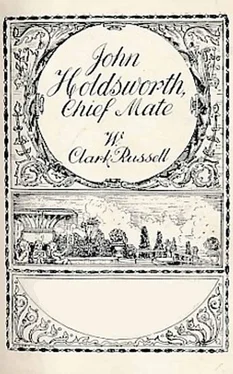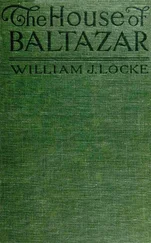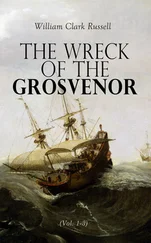William Clark Russell - John Holdsworth
Здесь есть возможность читать онлайн «William Clark Russell - John Holdsworth» — ознакомительный отрывок электронной книги совершенно бесплатно, а после прочтения отрывка купить полную версию. В некоторых случаях можно слушать аудио, скачать через торрент в формате fb2 и присутствует краткое содержание. Жанр: unrecognised, на английском языке. Описание произведения, (предисловие) а так же отзывы посетителей доступны на портале библиотеки ЛибКат.
- Название:John Holdsworth
- Автор:
- Жанр:
- Год:неизвестен
- ISBN:нет данных
- Рейтинг книги:3 / 5. Голосов: 1
-
Избранное:Добавить в избранное
- Отзывы:
-
Ваша оценка:
- 60
- 1
- 2
- 3
- 4
- 5
John Holdsworth: краткое содержание, описание и аннотация
Предлагаем к чтению аннотацию, описание, краткое содержание или предисловие (зависит от того, что написал сам автор книги «John Holdsworth»). Если вы не нашли необходимую информацию о книге — напишите в комментариях, мы постараемся отыскать её.
John Holdsworth — читать онлайн ознакомительный отрывок
Ниже представлен текст книги, разбитый по страницам. Система сохранения места последней прочитанной страницы, позволяет с удобством читать онлайн бесплатно книгу «John Holdsworth», без необходимости каждый раз заново искать на чём Вы остановились. Поставьте закладку, и сможете в любой момент перейти на страницу, на которой закончили чтение.
Интервал:
Закладка:
And so a week went by, and the ship strove with the baffling winds, which blew directly from the quarter to which her bowsprit should have pointed, and captain and men began to chafe, finding the job of putting the ship about tiresome at last.
On the seventh day, about the hour of sunset, the wind fell, and the surface of the sea became polished as glass, though from the north-east there came, through the mighty expanse of water, a long and regular swell, which made the ship rise and fall as regularly as the breath of a sleeper.
“We shall have the wind from that quarter, I think, sir,” said Holdsworth to the skipper.
“Or is this an after-swell, Mr. Holdsworth?” suggested the skipper, sending his keen gaze across the sea to the horizon, where the sky was as blue as it was overhead.
There was no telling. This long and regular swell might be the precursor of a gale, or the effects of one that had passed. The barometer had fallen, but this might only indicate a southerly wind, not necessarily dirty weather. The heavens were perfectly tranquil; the day was fading into a serene and gloriously beautiful evening, with no hint in all its benign aspect to suggest the need of the slightest precaution.
Mrs. Ashton was at the piano, accompanying Mr. St. Aubyn to a song, which he sang so affectedly that some of the hands forward mimicked him, and the forecastle seemed full of guinea-pigs.
Her husband popped his head over the skylight and called to her to come and view the sunset. Up she came, escorted by Mr. Holland and the actor, flounced showily into a chair, and fell into a rapture.
“Oh, how beautiful! The sea looks like gold! doesn’t it, Captain Steel? See how red the sails are! Ah, if I could only paint! what fame such a picture as this would bring me.”
True; but then what manner of pigments was needful to reproduce the glory, the colour, the calm, the infinity of that wonderful scene!
The sun was sinking down a cloudless horizon, and was now a vast crimson ball, throbbing and quivering with his lower limb upon the sea-line. There was something overwhelming in the unspeakable majesty of his unattended descent. As the huge crimson body appeared to hang for some moments above the sea before dipping, even Mrs. Ashton held her tongue, and seemed impressed with the tremendous spectacle of loneliness submitted by the globe of fire sinking away from the sky with the vast solitude of the deep in the foreground. Far into the measureless ocean he had sunk a cone of fire, while the heights above and around him were dim with burning haze. The sails of the “Meteor” were yellow in the expiring light; her topmasts seemed veined with lines of flame; and the brass-work about her decks reflected innumerable suns, each with threads of glory about it, that blinded the eyes to encounter.
But even while they gazed the sun vanished, and darkness came with long strides across the deep, kindling the stars and transforming the masts and yards of the ship into phantom tracery as delicate as frostwork to look at.
“Upon my word!” exclaimed Mr. Holland in a tone of rapture, “that’s as fine a sight as I must hope to see anywhere.”
“If you could introduce a scene like that, Mr. St. Aubyn, on the stage, eh?” laughed the General.
“Why, as to that,” replied Mr. St. Aubyn, “let me tell you, General, that there are some very fine scenes to be found in the large theatres in London. In the second act of ‘Pizarro,’ as I saw it the other night at Drury Lane, there’s a scene representing the Temple of the Sun; the sun is setting—and God knows how they managed it, but the sun did sink, not like yonder one, but very finely in clouds, just as ‘Ataliba’ exclaims, drawing his sword, ‘Now, my brethren, my sons, my friends, I know your valour. Should ill success assail us.’”...
“Yes, yes,” interrupted Mr. Holland impatiently; “but I always considered ‘Pizarro,’ as a play, to be full of very poor rant. Who talks in real life like the fellows in that piece are made to talk?”
“My dear sir!” exclaimed Mr. St. Aubyn with a smile of contempt, “the stage is the arena of poetry; we are idealists.”...
“Because you never mean what you say,” said Mr. Ashton, lighting a cigar.
“Oh, excuse me,” rejoined Mr. St. Aubyn; “true actors are always in earnest. Siddons was.”
“I once met Sarah Siddons,” said Mrs. Ashton. “Do you remember, dear, at Lord Shortlands?” addressing her husband.
“I was only once at a theatre in my life,” observed Captain Steel, who had been listening to the conversation with an impressed face. “That was at Plymouth. They gave us our money’s worth. There was plenty of fighting and love-making, and two traitors, both of whom died game and covered with blood. There was a little too much gunpowder at the end; but I rather think they raised smoke to hide the acting, which fell off as the piece made headway. The best part of the entertainment, to my thinking, was a fight between two sailors in a private box. Mr. St. Aubyn, where do you gentlemen, when you are run through the body, stow all the blood you lose? That’s often puzzled me to think.”
“Oh, don’t let me hear,” cried Mrs. Ashton. “I hate to be told such secrets.”
“Captain,” said the General, “how long is this calm going to last?”
“All night, I am afraid. How’s her head?” sang out the captain.
“East-south-east, sir,” responded the man at the wheel.
“We’re homeward bound,” said the captain laughing; “the old girl wants to get back again.”
He walked away from the group, and stood near the wheel, gazing aloft and around. The passengers continued talking and laughing, their voices sounding unreal when listened to at a distance, and with the great, desolate, silent sea breathing around. The sails flapped lazily aloft, and the wheel-chains clanked from time to time as the vessel rose and fell. Mrs. Tennent came on deck, the captain joined her, and they walked up and down. On the other side of the deck paced the second mate. Forward were the dark shadows of some of the hands upon the forecastle, smoking pipes and talking in low voices.
The night had fallen darkly; there was no moon, but the stars were large and brilliant, and glittered in flakes of white light in the sea. Presently a fiddle was played in the forecastle, and a voice sang a mournful tune that sounded weirdly in the gloom, and with a muffled note. The air and voice were not without sweetness, but there was the melancholy in it which many songs popular among sailors have, and the wailing cadence was helped out by the ghostly sails rearing their glimmering spaces, and the subdued plash of the water about the bows, as the ship sank into the hollows of the swell.
Mrs. Tennent stopped, with the captain, at the poop-rail to listen.
“What odd music!” cried Mrs. Ashton. “It sounds as if some one were playing out in the sea there.”
“Let’s have the fiddler here,” said Mr. Holland. “I like to enlarge my mind by observation, and have never yet heard a real Jack Tar sing.”
“Oh yes! oh yes!” exclaimed Mrs. Ashton, while Mr. St. Aubyn called out, “I’ll go and fetch him.”
“Better stop where you are, sir,” said the skipper, drily; “the forecastle’s a dangerous hold for landsmen to put their heads into. Mr. Thompson,” he called to the second mate, “just go and send that fiddler aft here.”
Presently came the man, followed at a respectful distance by a crowd of his mates, who drew to the capstan on the quarterdeck, and waited for what was to follow.
The fiddler and vocalist was a stumpy seaman, with black whiskers, a hooked nose, and keen black eyes, dressed in loose canvas breaches, well smeared with tar, and a canvas shirt, with a belt about his middle, in which was a sheath-knife. He hailed from Southampton, but had gone so many voyages in every species of ships—Danish, French, Spanish, American—that he might fairly claim to belong to the whole world.
Читать дальшеИнтервал:
Закладка:
Похожие книги на «John Holdsworth»
Представляем Вашему вниманию похожие книги на «John Holdsworth» списком для выбора. Мы отобрали схожую по названию и смыслу литературу в надежде предоставить читателям больше вариантов отыскать новые, интересные, ещё непрочитанные произведения.
Обсуждение, отзывы о книге «John Holdsworth» и просто собственные мнения читателей. Оставьте ваши комментарии, напишите, что Вы думаете о произведении, его смысле или главных героях. Укажите что конкретно понравилось, а что нет, и почему Вы так считаете.











![William Frith - John Leech, His Life and Work, Vol. 2 [of 2]](/books/748201/william-frith-john-leech-his-life-and-work-vol-thumb.webp)
